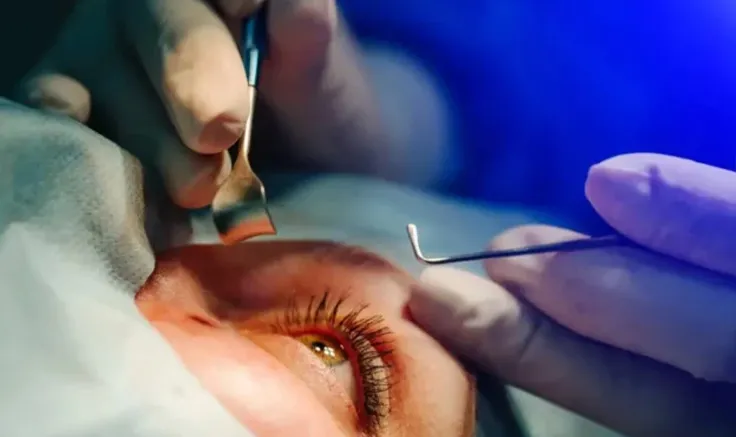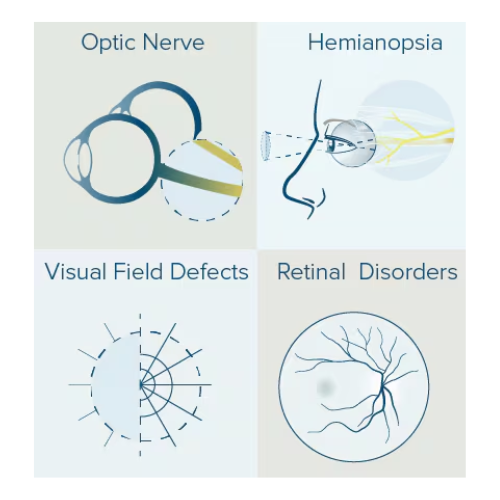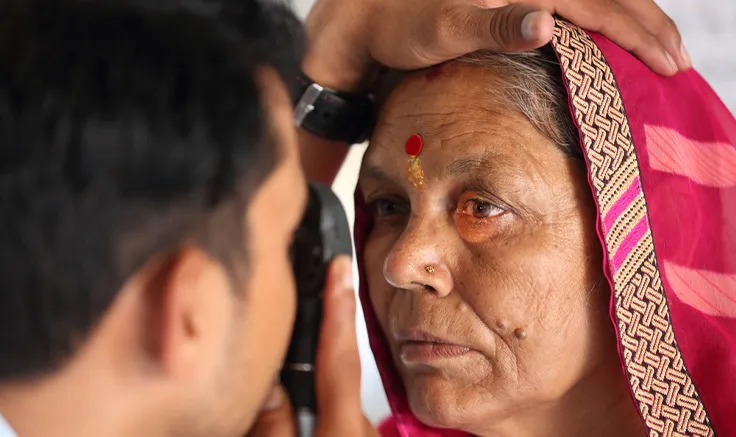- Home |
- About Us |
- Services |
- Our Doctors |
- Resources |
- Contact Us |
- Book Appointment

What is Neuro-Ophthalmology?
Have you ever wondered how your eyes and brain work together to produce clear vision? Neuro-ophthalmology is a specialized field that bridges the gap between your eyes and brain. It focuses on understanding how issues in the optic nerve, eye muscles, or brain can affect vision. At Kailash Eye Care, we use advanced diagnostic technologies to identify and treat vision problems that go beyond the need for glasses. Our expert team works to provide precise treatments for complex neuro-ophthalmic conditions.
Book Appointment
Common Neuro-Ophthalmic Diseases
Neuro-ophthalmic diseases involve both the eyes and brain, affecting how visual information is processed. Here are some of the conditions we treat:
- Optic Neuritis: Inflammation of the optic nerve, often linked to multiple sclerosis, which can cause blurry vision. Early diagnosis and treatment can prevent lasting damage.
- Optic Neuropathy: Damage to the optic nerve from poor blood flow, toxins, or vitamin deficiencies. Prompt treatment is vital to preserve vision.
- Papilledema: Swelling of the optic nerve due to increased intracranial pressure. Detecting the underlying cause quickly is essential to protect vision.
- Ocular Myasthenia Gravis: A condition causing muscle weakness in the eyes, leading to symptoms like double vision or droopy eyelids. Treatment helps manage and reduce these symptoms.
- Brain Tumors or Strokes Affecting Vision: Brain conditions can disrupt vision by interfering with the pathways that connect the eyes and brain. Thorough testing helps us determine the most effective treatment.
- Idiopathic Intracranial Hypertension (IIH): Excessive pressure inside the brain without a clear cause, leading to vision changes. Treatments, ranging from medications to surgery, help reduce pressure and protect vision.

Diagnostic Modalitites
At Kailash Eye Care, we use state-of-the-art neuro-imaging tools and advanced eye mapping techniques to diagnose complex vision issues:
- Optical Coherence Tomography (OCT):: A high-definition imaging tool that takes detailed pictures of the eye’s layers, allowing us to spot subtle nerve and retina changes.
- Visual Field Analyzers:: These create a map of your vision to detect any gaps or blind spots.
- MRI & CT Scans:Advanced imaging to visualize the brain and optic nerve connections.
- Fundus Fluorescein Angiography (FFA):A test using special dye to observe blood flow in the eyes, helping to diagnose issues like papilledema.
- Electrophysiology Testing:Includes Visual Evoked Potentials (VEP) and Electroretinography (ERG) to measure how your brain and retina respond to visual stimuli.
Treatments Offered
Medications
We prescribe targeted medications to reduce inflammation, control pressure, and manage immune system responses, depending on the condition.
Surgical Interventions
In some cases, surgery is necessary to relieve pressure in the brain, repair nerve damage, or address structural issues affecting vision.
Eye Exercise Therapy
Like physical therapy for the eyes, specific exercises can strengthen eye muscles and improve coordination.
Immune System Treatments
If autoimmune conditions are affecting your vision, we offer treatments to modulate your immune system and prevent further damage.
Botox Injections
A natural healing approach to treat damaged eye surfaces and promote faster recovery.
Special Glasses and Vision Aids
For conditions like double vision or vision loss, we provide customized glasses or vision aids, such as prism lenses and magnifiers, to improve daily functioning.
Brain Stimulation
Emerging techniques in brain stimulation can help improve vision by modulating brain activity related to visual processing.
Lifestyle Modifications
We also recommend lifestyle changes such as stress management and proper nutrition to support overall eye health.
Myths & Facts
Here are some common misconceptions about neuro-ophthalmology and the facts that set the record straight:
- Myth:Neuro-ophthalmic diseases always cause blindness.
- Fact:While serious, these conditions don’t always lead to blindness. With early treatment, we can often preserve or improve vision
- Myth : Neuro-ophthalmology only deals with eye diseases.
- Fact:It focuses on how the eyes and brain work together—an issue that involves both systems, not just the eyes.
- Myth : Treatment for neuro-ophthalmic conditions is only palliative.
- Fact:Many treatments, including medications, surgeries, and therapies, can significantly improve vision.
- Myth : Neuro-ophthalmic exams are the same as regular eye exams
- Fact:These exams are more advanced and involve specialized imaging and tests to evaluate both the eye and brain.
- Myth : Neuro-ophthalmology is only necessary for older adults.
- Fact:Vision problems can affect people of all ages, including children and young adults. Early diagnosis and treatment are crucial.
Did You Know?
At Kailash Eye Care, we offer cutting-edge neuro-ophthalmic care tailored to your individual needs. Our team of experts uses the latest technology to accurately diagnose and treat vision problems related to both the eyes and brain. Whether it's brain-related vision problems, optic nerve disorders, or eye movement issues, we provide personalized care to help you maintain or restore clear vision.

Book an Appointment Today at Kailash Eye Care!
At Kailash Eye Care, we offer cutting-edge neuro-ophthalmic care tailored to your individual needs. Our team of experts uses the latest technology to accurately diagnose and treat vision problems related to both the eyes and brain. Whether it's brain-related vision problems, optic nerve disorders, or eye movement issues, we provide personalized care to help you maintain or restore clear vision.
Book Appointment



